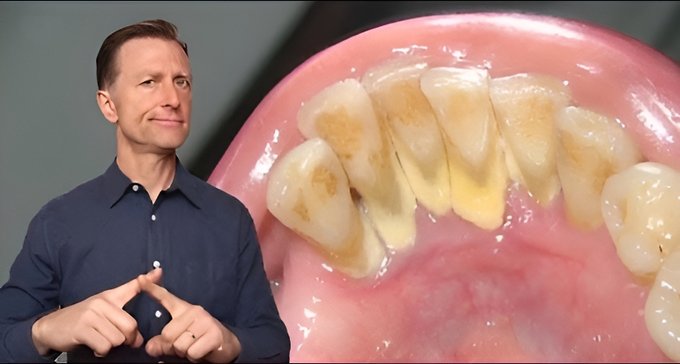
Brushing twice daily isn’t enough to prevent tartar. That hard buildup on your teeth is bacteria shielded by a mineralized layer.
Here’s a simple remedy with 3 ingredients to manage tartar naturally—starting with the first
1/ Baking soda (sodium bicarbonate) is a proven oral alkalizer.
It neutralizes acidity, supports enamel health, & prevents bacterial biofilm formation.
Its mild abrasiveness helps remove plaque without damaging enamel.
To understand its full benefit, let’s first define tartar.
What is tartar?
Tartar forms when dental plaque—an organized community of bacteria—mineralizes and hardens.
This microbial structure is called a biofilm.
This calcium-based matrix protects bacteria, helping them evade the immune system and resist antimicrobial agents.
Biofilms are found throughout nature, including the mouth, allowing harmful bacteria to thrive on teeth and gums.
Left untreated, this leads to:
•Gum inflammation
•Receding gums
•Bad breath
•Enamel erosion
•Tooth decay
But what truly drives tartar formation?
The main driver of tartar is acidic pH, often caused by high sugar intake and poor diet.
Acid-producing bacteria thrive in this environment, eroding enamel and pulling calcium from teeth—fueling tartar buildup.
So how does baking soda help?
Baking soda addresses this by:
• Raising oral pH
• Buffering bacterial lactic acid
• Supporting enamel remineralization
• Disrupting biofilm structure
Its chemical similarity to saliva makes it a safe & effective intervention.
Now, let’s move to the second ingredient…
2/ Hydrogen Peroxide (3%)
Hydrogen peroxide is another naturally occurring compound found in human saliva, acting as a first-line antimicrobial defense.
At proper concentrations, it provides broad-spectrum antimicrobial activity, and helps break down bacterial biofilms.
Here’s the protocol:
•¼ tsp baking soda
•¼ tsp 3% food-grade hydrogen peroxide
•Mix into ½ cup of water
After brushing with toothpaste, dip your toothbrush into the solution and gently brush, focusing on areas where tartar tends to build up.
Now, for the last one…
3/ Vitamin K2
Emerging research shows vitamin K2’s key role in regulating calcium both orally and systemically.
It activates proteins that direct calcium to bones and teeth, while preventing its buildup in soft tissues, such as arterial walls and dental plaque.
There’s more…
Clinical evidence shows vitamin K2 may reduce plaque and improve tooth integrity, especially when combined with vitamin D3.
Dental health is biochemical. By addressing tartar’s root causes, you can support long-term oral health and reduce the need for invasive procedures.
